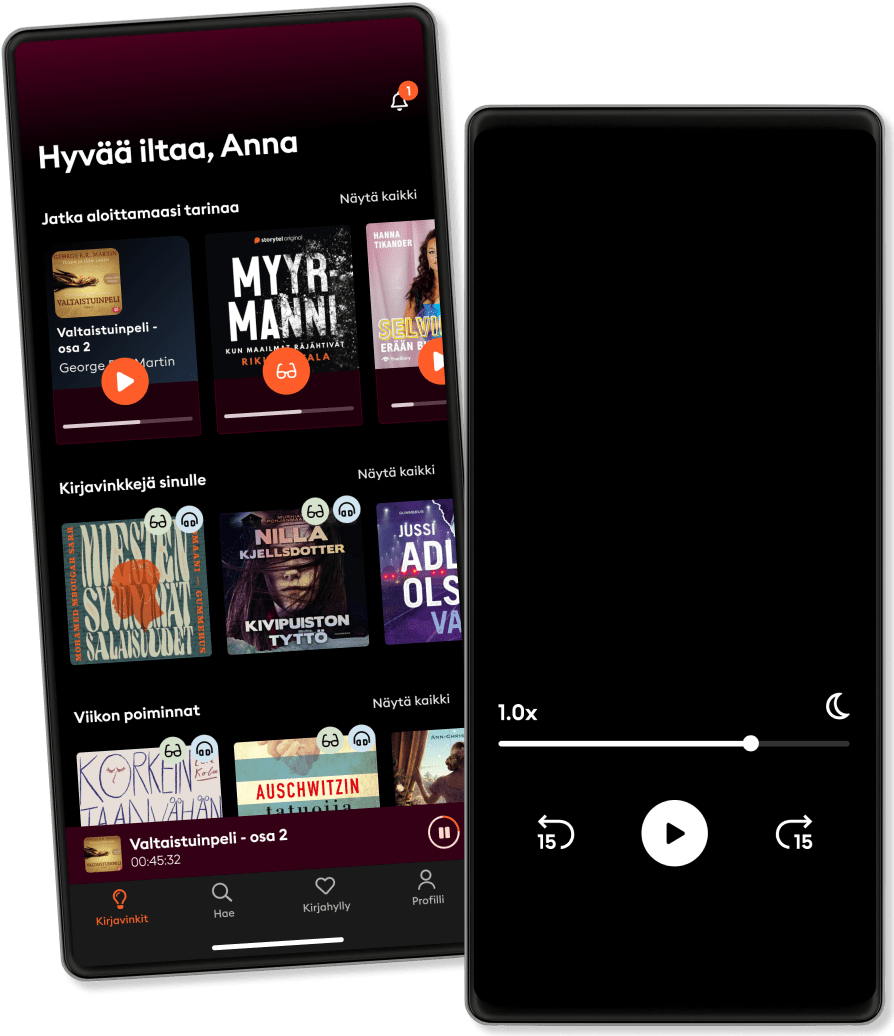Kuuntele missä ja milloin haluat
Astu tarinoiden maailmaan
- Pohjoismaiden suosituin ääni- ja e-kirjapalvelu
- Uppoudu suureen valikoimaan äänikirjoja, e-kirjoja ja podcasteja
- Storytel Original -sisältöjä yksinoikeudella
- Ei sitoutumisaikaa

Emile or On Education
- Kirjailija
- Lukija
- Kustantaja
- Pituus
- 22T 42M
- Kieli
- Englanti
- Format
- Kategoria
Henkinen kasvu
The Social Contract and Discourse on Inequality may be the two principal philosophical works for which Jean-Jacques Rousseau (1712-1778) is remembered today, but his educational treatise-novel, Emile or On Education, can claim to be an equally important and, for its time, radical work.
Published in 1762, it had a profound impact on the approach to the education and upbringing of a child, through infancy, childhood, adolescence and into adulthood. This was partly fuelled by the format - for Rousseau presents before us the boy Emile, taking him through the various stages of life, and as Emile becomes a young man, introducing a female counterpart, Sophie. This device personalises what would otherwise be a more formal philosophical presentation.
Emile or On Education is divided into five parts. In book I, Rousseau discusses the challenges of man as a self-centred being, who nevertheless has to learn to live in the world. Rousseau outlines his educational philosophy: ‘Plants are fashioned by cultivation, man by education.’ In book II, Rousseau focusses on the growing child, the child and its place in the world. He argues that this is the time to encounter nature directly in all its varying delights. Book III sees Rousseau placing high on the agenda the learning of a trade, especially a manual skill, and notes the crucial effect played by role models. Book IV outlines the challenges of the teenage world and finally, in book V, covering the early '20s, Rousseau introduces Sophie. His ideas concerning the education of girls are inevitably fashioned by 18th-century views on women’s expected role in society, something which was quickly challenged by figures such as Mary Wollstonecraft.
But though Emile or On Education is undeniably a product of its time, it has profoundly influenced educational concepts right into the 21st century. Rousseau argues for the importance of physical activity in the early years, for example, playing outside and interacting with nature. Only later, as adolescence approaches, should formal study play a more prominent part. The adolescent should approach issues such as religion and philosophy with an open mind (this brought Rousseau and Emile directly into conflict with the conventional religious institutions, resulting in the banning, and even burning, of the book in Paris and Geneva).
Emile or On Education proved a milestone in educational reform and it has remained a stimulating document. For example, it asks, ‘Is it good for young people to travel? It should be asked, Are men the better for having travelled?’ And further, ‘The misuse of books is the death of sound learning...there was never so much reading in any age as the present, and never was there less learning...so many books lead us to neglect the book of the world.’
Translation by Barbara Foxley.
© 2021 Ukemi Audiobooks from W. F. Howes Ltd (Äänikirja): 9781004134618
Julkaisupäivä
Äänikirja: 23. elokuuta 2021
Avainsanat
Saattaisit pitää myös näistä
- The Reveries of the Solitary Walker Jean-Jacques Rousseau
- Leviathan: or The Matter, Form, and Power of a Commonwealth, Ecclesiastical and Civil Thomas Hobbes
- Discourse on Inequality Jean-Jacques Rousseau
- The Story of Philosophy: The Lives and Opinions of the Greater Philosophers Will Durant
- Kant: A Very Short Introduction Roger Scruton
- On the Social Contract Jean-Jacques Rousseau
- A Discourse on Method, Meditations on the First Philosophy, and Principles of Philosophy René Descartes
- On the Genealogy of Morals Friedrich Nietzsche
- The Nicomachean Ethics Aristotle
- A Brief History of Equality Thomas Piketty
- Rakel Satu Rämö
4.1
- Sara Sieppi: Oliks sulla vielä jotain? Wilma Ruohisto
4.5
- Rafael Christian Rönnbacka
4.5
- Verikosto – Mustalaisjohtajan elämä Rami Mäkinen
3.4
- Sarjamurhaajan tytär Freida McFadden
3.8
- Neropatin päiväkirja: Kuumat paikat: Neropatin päiväkirja 19 Jeff Kinney
4.6
- Sanna Marin. Poikkeuksellinen pääministeri Salla Vuorikoski
3.8
- Tony Halme. Uho, tuho ja perintö Mikko Marttinen
3.6
- Kotiapulainen valvoo Freida McFadden
3.9
- Avoin: Krista Pärmäkoski Laura Arffman
4.1
- Henkka Aflecht - Dekkarivuodet yksityisetsivänä 2: Seurantakeikat 16-28 Henry Aflecht
4.5
- Sinusta pidän aina kiinni Lucy Score
4
- Vangittu kauneus Lucinda Riley
4.2
- Virallisesti syytön: Rikostoimittajan näkemys Ulvilan Vyyhdistä Tiia Palmén
4
- Vegetaristi Han Kang
3.4
Valitse tilausmalli
Lähes miljoona tarinaa
Suosituksia juuri sinulle
Uusia Storytel Originals + eksklusiivisia sisältöjä kuukausittain
Turvallinen Kids Mode
Ei sitoutumisaikaa
Standard
Sinulle joka kuuntelet säännöllisesti.
1 käyttäjätili
50 tuntia/kuukausi
Ei sitoutumisaikaa
Premium
Sinulle joka kuuntelet ja luet usein.
1 käyttäjätili
100 tuntia/kuukausi
Ei sitoutumisaikaa
Unlimited
Sinulle joka haluat rajattomasti tarinoita.
1 käyttäjätili
Kuuntele ja lue rajattomasti
Ei sitoutumisaikaa
Family
Kun haluat jakaa tarinoita perheen kanssa.
2-6 tiliä
100 tuntia/kk jokaiselle käyttäjälle
Ei sitoutumisaikaa
2 käyttäjätiliä
26.99 € /kuukausiFlex
Sinulle joka kuuntelet vähemmän.
1 käyttäjätili
20 tuntia/kuukausi
Säästä käyttämättömät tunnit, max 20h
Ei sitoutumisaikaa
Suomi
Suomi